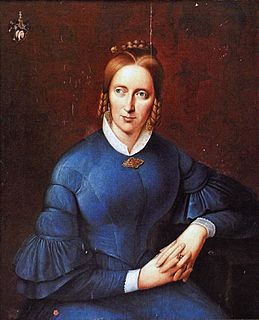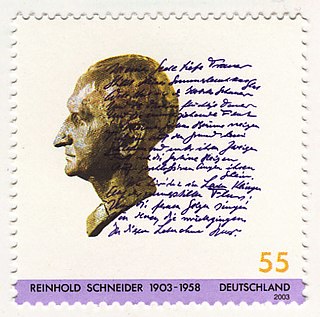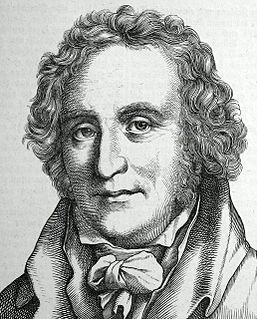 W
WClemens Wenzeslaus Brentano was a German poet and novelist, and a major figure of German Romanticism. He was the uncle, via his brother Christian, of Franz and Lujo Brentano.
 W
WBaroness Anna Elisabeth Franziska Adolphine Wilhelmine Louise Maria von Droste zu Hülshoff, known as Annette von Droste-Hülshoff, was a 19th-century German writer and composer. She was one of the most important German poets and author of the novella Die Judenbuche.
 W
WReinhold Schneider was a German poet who also wrote novels. Initially his works were less religious, but later his poetry had a Christian and specifically Catholic influence. His first works included ones about Luís de Camões and Portugal.
 W
WAngelus Silesius, born Johann Scheffler and also known as Johann Angelus Silesius, was a German Catholic priest and physician, known as a mystic and religious poet. Born and raised a Lutheran, he adopted the name Angelus and the epithet Silesius ("Silesian") on converting to Catholicism in 1653. While studying in the Netherlands, he began to read the works of medieval mystics and became acquainted with the works of the German mystic Jacob Böhme through Böhme's friend, Abraham von Franckenberg. Silesius's mystical beliefs caused tension between him and Lutheran authorities and led to his eventual conversion to Catholicism. He took holy orders under the Franciscans and was ordained a priest in 1661. Ten years later, in 1671, he retired to a Jesuit house where he remained for the rest of his life.
 W
WReinhard Sorge was a German dramatist and poet. He is best known for writing the Expressionist play The Beggar, which won the Kleist Prize in 1912. Sorge served in the Imperial German Army in World War I beginning in 1915. He was killed in action at the Battle of the Somme in summer 1916.
 W
WFriedrich Spee was a German Jesuit priest, professor, and poet, most well-known as a forceful opponent of witch trials and one who was an insider writing from the epicenter of the European witch-phobia. Spee argued strongly against the use of torture, and as an eyewitness he gathered a book full of details regarding its cruelty and unreliability. He wrote, "Torture has the power to create witches where none exist."
 W
WFriedrich Leopold Graf zu Stolberg-Stolberg, was a German poet, lawyer, and translator born at Bramstedt in Holstein.
 W
WUlrich von Zatzikhoven was the author of the Middle High German Arthurian romance Lanzelet.